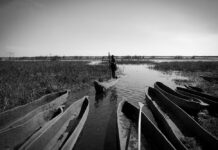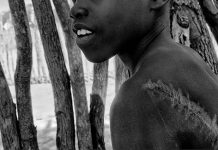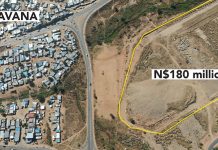By Tileni Mongudhi | 31 August 2021
MINISTER of environment, forestry and tourism Pohamba Shifeta has hand-picked businessman Laban Kandume’s company to exclusively transport travellers into the Namib Desert’s renowned Sossusvlei area.
This is set to affect the income of the struggling state-owned Namibia Wildlife Resorts (NWR), which may lose as much as N$10 million a year.
NWR has been instructed to partner with Sky Eye Hospitality and Tours, a company that is 75% owned by Kandume, who has a reputation for securing multimillion-dollar tenders at the Ministry of Agriculture, Water and Land Reform.
Fillemon Hasheela is the other shareholder, with a 25% stake.
Shifeta declined to comment on the issue and referred queries to the ministry’s spokesperson and executive director.
NWR was not informed of what was afoot, and the contract was never advertised.
The Sossusvlei 4×4 shuttle concession is for transporting tourists and visitors along a 5 km stretch to Deadvlei in the Namib Naukluft Park.
Travellers drive the 90 km from the Sesriem gate, but the final 5 km to Deadvlei requires 4×4 vehicles.
NWR offers game-viewing shuttle vehicles.
It also has the advantage of clients being able to enjoy sundowners and the sunrise at Deadvlei – a privilege guests at other lodges miss as they may only enter the park gates after sunrise and must leave before sunset.
NWR has generated around N$10 million a year from this concession. Sources at NWR says during the peak tourist season the shuttle service rakes in about N$1,5 million a month.
This was before the Covid-19 pandemic struck.
NWR was informed by executive director of environment, forestry and tourism Theo Nghitila in April last year that it would no longer have the exclusive right to the shuttle service.
In a letter seen by The Namibian, Nghitila informed NWR managing director Matthias Ngwangwama of the ministry’s decision.
“The honourable minister [Shifeta] has awarded a concession to Sky Eye Hospitality and Tours (SEHT) to operate shuttle services at the Sossusvlei area in the form of motorised passenger transport,” says Nghitila’s letter, dated 7 April 2020.

The letter came only six months after Sky Eye Hospitality and Tours was registered.
The executive director further instructed NWR to work with Sky Eye Hospitality and Tours.
“The ministry fully recognises the role Namib (sic) Wildlife Resorts (NWR) plays in the current shuttling of passengers, hence the aforementioned concession is awarded on condition that SEHT engages NWR to see how you can work together,” Nghitila stated.
Sources criticised the decision, saying Sky Eye Hospitality and Tours offered no experience or value.
Despite NWR having operated the Sossusvlei four-wheel drive shuttle concession for more than a decade, the ministry insists it never granted the parastatal such rights to begin with.
IN THE DARK
The Namibian understands that NWR has not been given any supporting documents to explain how the ministry came to this conclusion.
A source told The Namibian NWR requested Nghitila to furnish it with supporting documents, including Sky Eye Hospitality’s proposal or business plan – to no avail.
The parastatal also pleaded with the ministry to reconsider the decision since any revenue loss would be detrimental to its operations.
NWR is on the verge of sending home close to 100 employees. It is also considering salary cuts across the board after cutting management’s pay by 20% last year.
Environment ministry spokesperson Romeo Muyunda last week said: “Namibia Wildlife Resorts has never had exclusive rights to these services and has never been a concession holder for these services.”
Muyunda said previous tourism and environmental experience is not a requirement for “unsolicited” proposals as in Sky Eye Hospitality and Tours’ case.
He said the ministry considers innovation and uniqueness.
Muyunda said the bidding company’s financial capacity to deliver the promised services is also considered.

“It should be noted that concessions are an important tool to enhance the economic empowerment of previously disadvantaged Namibians and their entrance into the tourism industry,” he added.
Former NWR and tourism ministry officials told The Namibian this month that such rights existed.
One version is that former president Hifikepunye Pohamba granted NWR exclusivity or first right of refusal to all concessions within national parks.
NWR allegedly has no choice but to partner with an unknown, but politically connected, company if it is to avoid being elbowed out of its much-needed revenue-generating rights.
According to a person familiar with Kandume’s unsolicited proposal, Sky Eye offered eco-friendly transport solutions.
Kandume’s outfit reportedly intends setting up a cable car and a helium balloon system, ostensibly to ensure minimum damage to the environment.
Kandume said he approached the ministry after noticing the destruction caused by off-road vehicles in the Namib Desert, especially around Sossusvlei and Deadvlei.
He also shot down claims that his new venture’s lack of tourism experience was an issue.
“The concept does not require experience in tourism in the ordinary sense,” he said.
He insisted that everything was done above board.
Kandume has been a main player in securing agriculture ministry tenders.
The Namibian reported in May this year that his company benefited from a N$180 million government contract for an incomplete fresh-produce market overlooking one of the poorest informal settlements in Windhoek.
His company was also allegedly involved in the construction of the agricultural ministry’s new head office in Windhoek.
Kandume’s company, Uundenge Agri Farm, also partnered with Swapo Party Youth League (SPYL) secretary Ephraim Nekongo in the past.
“Uundenge” means siblings in Oshiwambo.
In 2017, Kandume’s Uundenge Investments CC was a subcontractor for debushing at Katima Farm and at the Liselo irrigation project in the Zambezi region.
* This article was produced by The Namibian’s Investigative Unit and the Advancement of Journalism Centre. Send story tips via your secure email to investigations@namibian.com.na.






